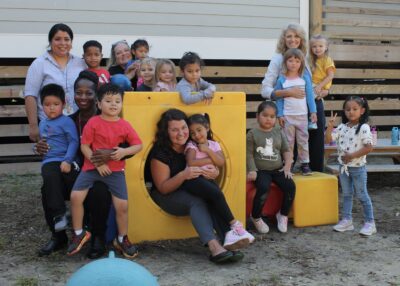
The 2024 State of Preschool Yearbook saw North Carolina moving up from 29th in the nation to 28th in preschool access for 4-year-olds, but that modest improvement was largely due to temporary federal relief funding. Pre-K enrollment is still far below pre-pandemic highs.
The annual report, from the National Institute for Early Education Research (NIEER), provides a snapshot of preschool education across the country. According to a press release accompanying the report, the 2023-2024 school year set national records for state-funded preschool enrollment and spending. However, just four states — California, New Jersey, New York, and Texas — made up more than half of the national spending total.
Currently, 44 states and the District of Columbia fund preschool programs serving primarily 4-year-olds, including North Carolina. Enrollment reached 37% of 4-year-olds and 8% of 3-year-olds nationwide, the report says.
Pre-K in North Carolina
The report found that in North Carolina for the 2023-2024 school year:
- The state met nine of the 10 research-based quality benchmarks recommended by NIEER.
- The North Carolina Pre-Kindergarten Program enrolled 27,304 children, an increase of 1,620 from the prior year.
- State spending totaled $115,259,501, and $66,776,585 in TANF funds and $12,281,934 in federal recovery funds supported the program, raising total funding by $23,807,791 (14%), adjusted for inflation, from the previous year.
- State spending per child (including TANF and federal relief) equaled $7,117 in 2023-2024, up $478 from 2022-2023, adjusted for inflation.
“The North Carolina General Assembly had the opportunity to approve the Governor’s recommended increase of $197 million for FY 2023-2025 to keep NC Pre-K viable and strong for North Carolina children, but they failed to do so,” said W. Steven Barnett, founder and senior director of NIEER. “The funding also would have helped the program retain qualified teachers at competitive salaries and help protect the program if federal funding for pre-k is cut.”
![]() Sign up for the EdWeekly, a Friday roundup of the most important education news of the week.
Sign up for the EdWeekly, a Friday roundup of the most important education news of the week.
The press release cited two additional points of concern for NIEER in the 2023-2025 state budget: Increased class sizes and changes to the minimum staff-to-child ratios for NC Pre-K. The press release also noted that 20% of NC Pre-K teachers were long-term subs, which can hurt quality.
Also of concern for NIEER are potential cuts to Head Start that have been proposed by the Trump administration.
“More than 13,000 3- and 4-year-olds in North Carolina could lose access to Head Start if federal funding for the program is eliminated,” said Allison Friedman-Krauss, lead author of the report. “Increased uncertainty about federal funding underscores the urgency for states to prioritize and expand early childhood investments.”
Pre-K nationally
According to the press release, NIEER’s Yearbook includes a special section pointing to Alabama, Michigan, New Mexico, and Oklahoma as strong examples that states can replicate — despite having taken different paths to success.
Overall, states spent more than $13.6 billion on preschool in 2023-2024, including $257 million in federal COVID-19 relief dollars, the press release says. That’s an increase of nearly $2 billion (17%) over the previous school year.
Preschool investments increased in all but five states with existing programs. Six states — California, Colorado, Maryland, New Jersey, New Mexico, and Texas — each boosted preschool spending by more than $100 million.
Related reading



NIEER calculated that preschool enrollment grew to 1,751,109 children nationwide, an increase of more than 111,000 from the previous year. Ten states saw enrollment grow by more than 20%: Alaska, Colorado, Delaware, Hawaii, Mississippi, Missouri, Nevada, New Mexico, North Dakota, and Ohio. California and Colorado added more than 30,000 children each, together accounting for more than 60% of the national enrollment increase.
Alabama, Hawaii, Michigan, Mississippi, and Rhode Island are the only states to meet all 10 of NIEER’s recommended benchmarks for preschool quality, the press release says. These benchmarks measure essential preschool quality indicators, including teacher qualifications, class sizes, early learning standards, and program assessments.
The press release includes questions about how the Trump administration’s proposed cuts to the U.S. Department of Education, U.S. Department of Health and Human Services, and other federal agencies will affect Head Start and other programs for children. If Head Start funding for children in low-income families is eliminated, the release says, access to public preschool will decline in several states by more than 10 percentage points, and by as much as 20 percentage points in some.
Recommended reading



